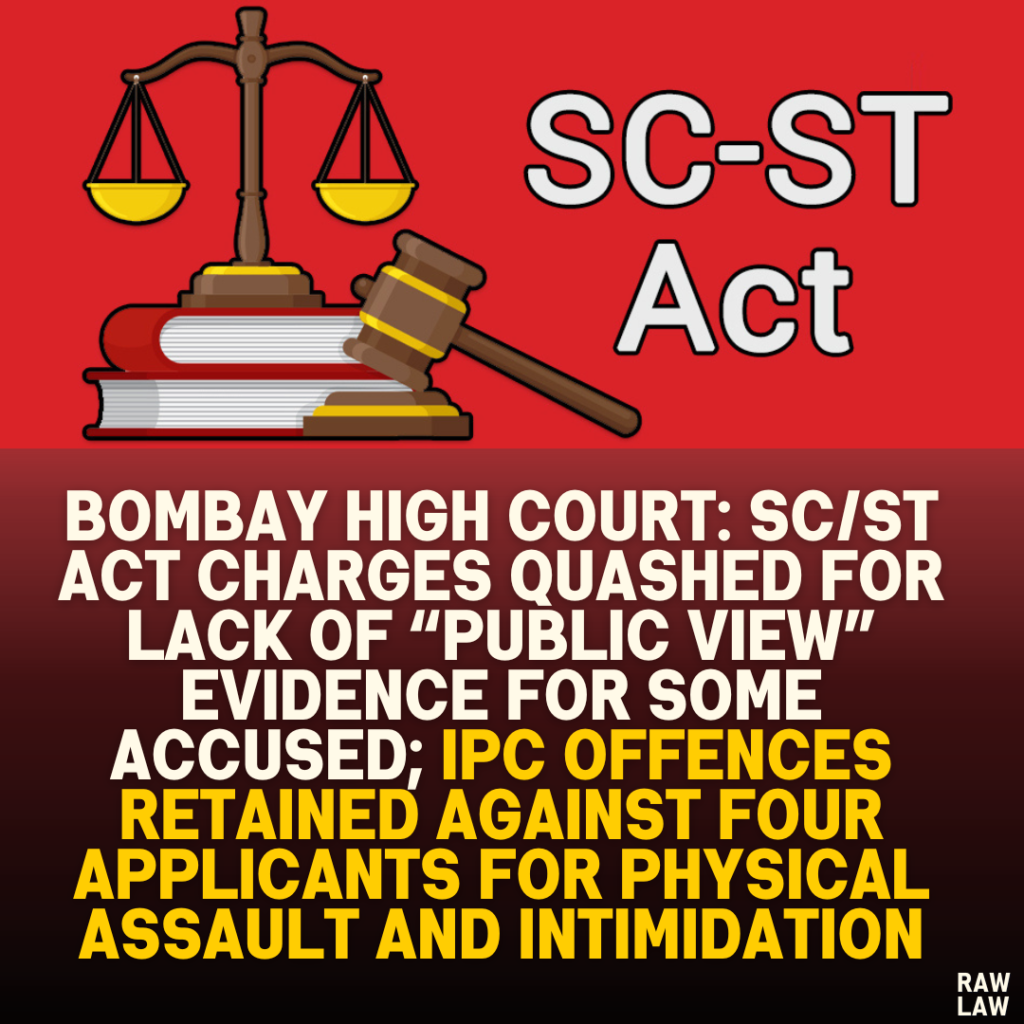Court’s Decision:
The Bombay High Court quashed charges under Sections 3(1)(r) and 3(1)(s) of the SC/ST Act against Applicants 1 to 4 due to the lack of evidence that the alleged caste-based abuse occurred in “public view.” The court entirely quashed the proceedings against Applicants 5, 7, 8, and 9, finding no direct evidence linking them to the incident. However, it upheld the charges under Sections 323 (causing hurt) and 506 (criminal intimidation) of the IPC against Applicants 1 to 4, stating that there was sufficient material to proceed on those counts.
Facts:
- Background:
- The respondent (a woman belonging to a Scheduled Caste) filed an FIR on July 12, 2022, alleging caste-based verbal abuse, physical assault, and intimidation by the applicants, who are relatives of the principal accused.
- The incident reportedly occurred on July 1, 2022, in a narrow lane where the respondent had gone to meet the principal accused, who had previously promised to marry her.
- Allegations:
- The respondent claimed that she was physically assaulted and verbally abused in the name of her caste by the applicants.
- Specific allegations against:
- Applicant 1: Verbally abused her and beat her with footwear.
- Applicant 2: Verbally abused her, pulled her hair, and insulted her caste.
- Applicant 3: Insulted her by stating that a person from her caste could only be a mistress, hit her with a chair, and assaulted her physically.
- Applicant 4: Pulled her hair, removed her burkha, and physically assaulted her while making casteist remarks.
- Applicants 5, 7, 8, and 9: Allegedly involved indirectly or through conspiracy, though they were not present at the scene.
- Supplementary Statement:
- Filed on August 4, 2022, adding new allegations and details that were not in the original FIR.
- Some claims in the supplementary statement contradicted or extended beyond the FIR.
Issues:
- Did the allegations under the SC/ST Act satisfy the legal requirements?
- Was the delay in filing the FIR and contradictions between the FIR and the supplementary statement significant enough to cast doubt on the allegations?
- Could the court quash the prosecution partially for certain applicants?
Petitioner’s Arguments:
- The FIR and supplementary statement were motivated by vengeance after the principal accused refused to marry the respondent.
- Many allegations in the supplementary statement were fabricated and recorded after legal advice.
- The alleged abuse did not occur in “public view,” a prerequisite for invoking Sections 3(1)(r) and 3(1)(s) of the SC/ST Act.
- No material evidence existed against Applicants 5, 7, 8, and 9, making the case against them baseless.
Respondent’s Arguments:
- The allegations of caste-based abuse and physical assault were consistent in the FIR and supplementary statement.
- Motive or delay in filing the FIR should not undermine the veracity of the claims.
- Applicants 1 to 4 intentionally insulted and assaulted the respondent because of her caste.
Analysis of the Law:
- SC/ST Act (Sections 3(1)(r) and 3(1)(s)):
- The court referred to precedents like Hitesh Verma v. State of Uttarakhand, which held that caste-based insults must occur in “public view” to attract the provisions of the SC/ST Act.
- In this case, the incident occurred in a narrow lane, with no independent witnesses or evidence to show that it happened in “public view.” This invalidated the charges under these provisions.
- Delay in Filing the FIR:
- The court noted that the FIR was lodged 12 days after the incident and the supplementary statement was recorded over a month later. Such delays raised doubts about the veracity of the allegations, especially as new details were added later.
- Distinction Between FIR and Supplementary Statement:
- The court observed that many allegations in the supplementary statement were absent in the FIR. It emphasized that the FIR must provide the foundation of the case and include all essential facts known to the informant.
- Partial Quashing of Charges:
- The court, relying on Ishwar Pratap Singh v. State of Uttar Pradesh, held that criminal proceedings could be partially quashed, retaining valid charges while dismissing others.
Precedent Analysis:
- B.N. John v. State of Uttar Pradesh: Allegations introduced for the first time in supplementary statements can undermine the credibility of the case.
- Mahmood Ali v. State of Uttar Pradesh: Criminal cases motivated by personal vendettas require careful scrutiny.
- Prakash Vitthal Bondirwad v. State of Maharashtra: SC/ST Act charges require proof of public view, without which they cannot be sustained.
Court’s Reasoning:
- Applicants 5, 7, 8, and 9:
- No allegations or evidence linked them to the incident.
- Their prosecution was quashed entirely.
- Applicants 1 to 4:
- Allegations of caste-based abuse were unsupported by evidence of “public view.”
- Physical assault and intimidation under Sections 323, 504, and 506 of the IPC were corroborated by the respondent’s statements and call data records, warranting continuation of prosecution on these charges.
Conclusion:
The court ruled as follows:
- Charges under the SC/ST Act were quashed for Applicants 1 to 4.
- Prosecution under IPC Sections 323, 504, and 506 was retained for Applicants 1 to 4.
- All charges were quashed for Applicants 5, 7, 8, and 9.
Implications:
- Reinforces the need for concrete evidence, particularly for SC/ST Act charges.
- Highlights the significance of the FIR as the foundation of the prosecution case.
- Demonstrates judicial discretion in quashing parts of a criminal case while retaining valid charges.




Pingback: Bombay High Court Quashes Stay on Swadeshi Mills Winding Up: Holds Revival Proposal as Veiled Attempt to Exploit Prime Land, Emphasizes Public Interest, Transparency, and Commercial Morality Under Section 466 of the Companies Act - Raw Law